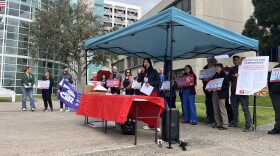SARAH MCCAMMON, HOST:
A day of mourning in Myanmar today after security forces killed at least 114 people on Saturday during protests against the February 1 coup. It was the bloodiest day since the coup and came as the military celebrated Armed Forces Day with parades and displays of military hardware in the capital and with live ammunition against protesters all over the country. Joining me now from neighboring Thailand is reporter Michael Sullivan. Michael, were things any better today?
MICHAEL SULLIVAN, BYLINE: They were. There were far fewer deaths than yesterday, which saw dozens killed in Myanmar's biggest city, Yangon, and in its second city, Mandalay, including several children. There were scattered protests today, but almost everyone knew that yesterday was going to be the pivotal day. Protesters had called for massive demonstrations against the military on its special day, and the military signaled its intentions on state-run television Friday night, warning protesters against taking to the streets, saying anyone who did so ran the risk of being - I'm quoting here - "shot in the head or the back," which, sadly, happened.
MCCAMMON: Wow. And, Michael, as I understand it, yesterday's violence was not limited to violently breaking up protests, was it? I mean, what else happened?
SULLIVAN: The military also launched airstrikes against an ethnic minority militia near the border with Thailand. The Karen National Union is one of many well-armed ethnic militias, some of whom have been fighting Myanmar's military for decades. And the air strikes may have been a reprisal for a KNU attack on one of the military's outposts last week. The KNU says it captured or killed nearly a dozen soldiers in that attack. And this is just another reminder of how fragmented the country is or was even before the coup. I mean, the military is fighting ethnic militias in the north, in the east, in the west, and now it's fighting its own in the heartland. And the protesters are now trying to entice the ethnic minorities into this fight and come out on the other end with a true federal state where ethnic minority populations would have much greater autonomy in their areas.
MCCAMMON: So you're describing this deadly violence this weekend. What kind of response has there been to yesterday's violence from the international community?
SULLIVAN: Pretty much what you would expect. The U.S. ambassador called yesterday's bloodshed horrifying. The EU called it a day of terror and dishonor. But the U.N. special rapporteur on Myanmar, Tom Andrews, wants more. He said that words of condemnation or concern are ringing hollow to the people of Myanmar while the military junta commits mass murder against them. And from Myanmar's two best friends right now, China and Russia, wasn't much of a response at all. In fact, both were among a handful of countries who sent representatives to the Armed Forces Day ceremonies in the capital, Naypyidaw, an event boycotted by most other countries, who don't want to be seen as endorsing this coup.
MCCAMMON: This is a grim situation. Is there any reason to believe things are going to get better and that the violence will end? Is there any sign of compromise?
SULLIVAN: Well, I'd like to say yes, Sarah, but at this point, no. I mean, Myanmar's military isn't really into compromise. They've ruled the country, often brutally, for much of the past 70 years. They think they've got this. They have the guns, and that's worked in the past. And despite the horrific scenes all over the country on Saturday, the protesters say they're not backing down at all. They want the military gone, full stop. So even though Southeast Asian nations are still urging both sides to sit down and talk, neither side really thinks they have anything to talk about. Meanwhile, economic activity has slowed to a crawl. And the military continues to show up at people's houses at night, dragging them out of their homes, looting those homes as they try to weed out dissenters and cow the rest.
MCCAMMON: And that's Michael Sullivan reporting from Chiang Rai, Thailand. Thank you, Michael.
SULLIVAN: You're welcome.
(SOUNDBITE OF MUSIC) Transcript provided by NPR, Copyright NPR.





